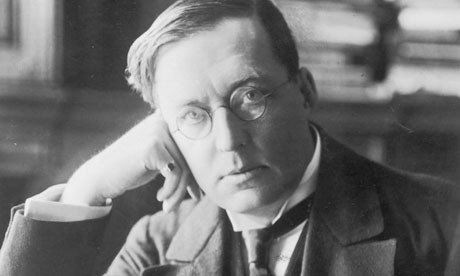Remittance Girl's Blog, page 33
May 26, 2012
MR James – One of My Favourite Short Story Writers
 Montague Rhodes James (1 August 1862 – 12 June 1936), was a Medieval Scholar and provost at Cambridge. In his spare time, he wrote ghost stories. Although his prose wasn’t terribly poetic, I always thought his sense of place and character was. He was also just a wonderful structural story plotter.
Montague Rhodes James (1 August 1862 – 12 June 1936), was a Medieval Scholar and provost at Cambridge. In his spare time, he wrote ghost stories. Although his prose wasn’t terribly poetic, I always thought his sense of place and character was. He was also just a wonderful structural story plotter.
All his ghost stories tend to be of the ‘creeping dread’ variety, rather than having any shock value. Or rather, the shock, when it comes, is always an interior one.
Most of his stories are available online, in text form at Project Gutenberg.
There are also a number of them in audio format from Librivox
Finally, there are a number of film versions of this stories, mostly produced by the BBC, available on You Tube. Two of my favourites are there: “Whistle and I’ll Come to you” and “A View from the Hill”
Whistle and I’ll Come to You, My Lad
A View from the Hill


May 25, 2012
Disillusion: A Step-by-Step Guide to a Cure

Anti-Delusional Pictograms for the romantically impaired. Designed to be printed and folded so it appears as the first sheet in a box of kleenex.
Dear [Insert Rejected Lover's Name Here],
Curing yourself of obsessive romantic delusions is hard. The mind is a tricky little beast and will, given any latitude at all, consistently reinterpret even the clearest and bluntest messages to its own liking. For this reason, enclosed please find a helpful instruction manual on how to disabuse yourself of any notions of reciprocity.
First, please read this:
I won’t meet you.
I won’t call you.
I won’t fuck you.
These words are clear, they brook no misinterpretation. They apply not only to the present but also to the future, so don’t get pedantic with the verb tense. There is no wiggle room in this missive. Understood?
I won’t meet you.
I won’t call you.
I won’t fuck you.
Right about now, you’re thinking: but he/she said he/she loved me!
That may in fact be true, but if they’ve said this, then they love you in a vastly different way to the way you love them and, anyway, it’s irrelevant to the present discussion. Because you aren’t after some abstract, intellectual affection here, are you?
ARE YOU?
Don’t be coy, answer the fucking question.
NO.
No, you’re not. And just in case your brain has taken in the message only partially and you feel it might be mistakenly sent to you but aimed at someone else… read it again:
I won’t meet you.
I won’t call you.
I won’t fuck you.
In fact, read it out loud. Read it so loud that it frightens your pet/s. Repeat it often. Make it your mantra:
I won’t meet you. I won’t call you. I won’t fuck you. I won’t meet you. I won’t call you. I won’t fuck you.I won’t meet you. I won’t call you. I won’t fuck you.I won’t meet you. I won’t call you. I won’t fuck you.I won’t meet you. I won’t call you. I won’t fuck you.I won’t meet you. I won’t call you. I won’t fuck you.I won’t meet you. I won’t call you. I won’t fuck you.I won’t meet you. I won’t call you. I won’t fuck you.I won’t meet you. I won’t call you. I won’t fuck you.I won’t meet you. I won’t call you. I won’t fuck you.I won’t meet you. I won’t call you. I won’t fuck you.I won’t meet you. I won’t call you. I won’t fuck you.I won’t meet you. I won’t call you. I won’t fuck you.I won’t meet you. I won’t call you. I won’t fuck you.I won’t meet you. I won’t call you. I won’t fuck you.I won’t meet you. I won’t call you. I won’t fuck you.I won’t meet you. I won’t call you. I won’t fuck you.I won’t meet you. I won’t call you. I won’t fuck you.I won’t meet you. I won’t call you. I won’t fuck you.I won’t meet you. I won’t call you. I won’t fuck you.I won’t meet you. I won’t call you. I won’t fuck you.I won’t meet you. I won’t call you. I won’t fuck you.
Yup. That many times. In fact, probably many more.
Every time you forget this very clear message, and you start thinking: Oh, but maybe…if… It’s time to repeat the mantra:
I won’t meet you.
I won’t call you.
I won’t fuck you.
And, just in case you still haven’t absorbed the message and its implications, or imagine yourself to be illiterate, dyslexic, or deaf, below please find a handy info-graphic.
 GET IT?
GET IT?
This learning aide was produced and supplied to you courtesy of sane, non-pathetic, fast learners of the world. Designed to be printed and folded so it appears as the first sheet in a box of kleenex.


May 24, 2012
Offense – The New Second Hand Smoke
Recently, American Airlines refused to let a woman continue on her journey wearing a t-shirt that says ‘If I wanted the government in my womb, I’d fuck a senator.” You can read more about the incident here. It wasn’t in response to a passenger complaint. One of the flight attendants took offense to it and complained to the captain, who spoke to the passenger in question and warned her she would not be allowed on her connecting flight until she took the t-shirt off.
I believe everyone has the right to be offended. Rarely can you control it when something offends you. It just does.
But since when did ‘being offended’ entitle you to put everyone else through hell? Since when did reading the word ‘fuck’ incapacitate anyone? When did it give them cancer or endanger their lives? Since when did holding a different opinion to someone else become INTOLERABLE?
If you can’t tolerate coming into contact with an offensive t-shirt (which is, let’s not be disingenuous, offensive and purposefully so), then quite honestly, how the fuck do you negotiate life in the 21st century? It seems pretty clear to me that someone who is that sensitive should seek work in a more sheltered environment than working with the public on an airline. People say ‘fuck’ all the time. Especially during turbulence. American Airlines shouldn’t have dealt with the passenger. They should deal with their staff.
And, just to clarify, this isn’t a right-wing/left-wing issue.
Last week, I got a lovely review at Dear Author. The reviewer, of course, summarized the story and went on to discuss how she felt about it. The next day, on Twitter, I am named in a mention as ‘@remittancegirl a piece of expat shit‘. Well, that got my attention, so I followed the thread and found out that a certain twitterperson had read the review, and on the basis of that, began a long tirade about the fact that I was a racist for writing Gaijin.
It almost instantly devolved from being about taking offense at the material, and became a very personally directed barrage of extremely nasty insults. Not about my poor writing skills or insensitive portrayals, but about me and my sexual habits and …well, I feel safe in paraphrasing her: I should just hurry up and die.
It offended her that the antagonist in the story, a Yakuza middle-man who rapes the protagonist, was Japanese. She felt it was the worst kind of racist stereotyping. She felt that, because I was ‘white’, I had no right to portray any other race as an antagonist in my fiction.
This was all based on a summary of the story in a review. She had not read the book and, in fact, she protested that she would never read it. She felt perfectly justified in accusing me of racism based on a third hand summary of a single piece of writing. And she felt perfectly justified in assuming I was ‘white’ because…? I have no idea.
Shindo, the antagonist in my story is indeed Japanese. So, of course, because the story is set in Japan, is the man who saves her physically, and so is the Fox Goddess in her dreams, who saves her spiritually. And although I am not Japanese, neither am I, racially, white.
Now, I accept that she was offended. Gaijin offends a lot of people for a lot of reasons. It contains erotically described non-consensual sex. It’s got violence in it. And it involves a clash of cultures. And I accept the fact that I, like any other writer alive, might inadvertently be racially, genderly, or sexually insensitive from time to time. I am very anxious to know if I have stereotyped someone and represented them in a bigotted way. Because, beyond anything else, that’s just bad writing.
However, I reserve the right to create and write characters who ARE bigotted. Because there are lots of prejudiced people in the world. Jennifer, my protagonist in Gaijin, definitely stereotypes the Japanese men she works with. I don’t think I’d call her a racist, but I would say that she makes some very unfair generalizations. Working in any part of the sex trade – even the mildest – can do that to you. Carl with a C, from the story Click, is most definitely a racist, a sexist, and a rapist. But neither Jennifer nor Carl with a C represent my world-view. They are characters. They don’t speak for me. They, essentially, speak for themselves.
I acknowledge that writing cultures, races and sexualities other than one’s own does entail treading in problematic territory. It is important to be mindful of issues of ‘orientalism’ and ‘post-colonialism’. And I sincerely think I am mindful of these things, I just don’t let them render me mute as a writer.
This presents me with a number of problems. First, I have not actually lived in the West much, although I was born there. I know much more about other parts of the world than I know about a lot of Western countries. Secondly, I think that to avoid writing characters who are of other races, cultures or sexuality to mine is probably more bigotted than avoiding them.
Quite honestly, I don’t think a lot about race. This is probably because I grew up in places where, for the most part, I was the outsider. I’ve been surrounded with people of different races all of my life. I tend to think a lot more about cultural differences than skin differences. And yet, I will freely admit that I am not without prejudice myself. No one is. No matter where we come from, or what skin we’re born with, we all end up acquiring prejudices through our cultures. I’m certainly not proud of my prejudices, but I acknowledge them. I think that’s the first step to attempting to purge yourself of prejudice – admit you have it, identify it, be critical of yourself for it.
In the meantime, I’m going to write what interests and compels me. I’m going to write about people from a lot of different places, but they are always going to be individuals first, before they are a nationality or a race or a sexual orientation, or even a gender.
And I’m going to write stories, and that involved having conflict. Protagonists and antagonists and some in between. I’m not going to spend a lot of time worrying about the post-colonial implications of what culture or race I choose them to be. I’m going to, as best as I can, write fully rounded characters who are not representations of anything other than themselves as individuals.
And this might offend you. And you have a right to be offended. But you don’t have a right to demand that what offends you be wiped off the face of the earth.


May 22, 2012
Other Tides

Photo: gaelx
The day I met you
the moon abandoned me for other tides,
I became a snake turned outside in,
shedding skin at every curt word.
At first I thought it coincidence
Until I noticed:
I only bleed when I cry
and only you make me cry.
Not Christ’s wounds, then
but the Magdalen’s curse:
the stigmata of the
easily overlooked.
Red rivers weave over thighs,
blood red pennies patter on the white tiles,
a knife-like sting between my legs,
and I’m giving birth to copper spiders.
One day, I promise myself,
all this will stop,
not at the eclipse of the moon,
but when I go blind.


May 18, 2012
Same Sex Marriage: Why Thumping Bibles at Bible Thumpers Doesn’t Work
I never really thought I needed to take a clear stance on this on my blog because I assumed that anyone reading my stories would intuitively know where I stood on the subject. It seems I was wrong. I received an email asking me to clearly state my position, so here it is:
If you recognize someone as a citizen of your country, if you allow them to vote and you tax them, then you must allow them to marry, regardless of gender or sexual orientation. Not to do this is to create / perpetuate an underclass of people who are not quite fully citizens. It is ethically wrong and it is dangerous. That is my intellectual position on the subject.
My emotional position is a little different. I simply cannot grasp why anyone would object to marriage between two people who love each other and want to make a lifetime and formal commitment to that relationship. This isn’t a position I came to after thought. I grew up surrounded by people of different races, cultures and sexual orientations. Had I taken my parents as the primary model for my view on marriage, I would believe it should be banned altogether, for anyone. My models of loving relationships were, primarily, non-straight ones. I think people have the right to be married. And I can’t really, emotionally, conceive of why anyone would object to that.
I have watched people who are against same sex marriage use the bible as the basis on which they object to it. And I have watched people who support same-sex marriage try to appeal to the opposition’s logic, using the same book. This doesn’t work.
I’d like to openly state, upfront, that I don’t believe the bible – old or new testament – is anything other than book. Admittedly, it has been the most influential book in history to the Western world. I don’t dispute its influence. But I not only dispute, but I refuse to accept that it is in any way ‘Holy’.
It’s a very long book, taken altogether. I have read all of it once and some of it a number of times. It has a fair number of internal inconsistencies. Something that might be expected of any aggregated text. Considering how large a text it is, it contains very few mentions of same-sex relations. There are, all told, six. Some are vague, some are not condemnations at all, and two are clearly hostile to it. Lesbians get off much easier. They’re not mentioned at all in the old testament and only once in the new. The BBC has a really good chart of the mentions and their various interpretations: http://news.bbc.co.uk/2/hi/3205727.stm
There are many more condemnatory prohibitions on other subjects. Adulterers, for instance, should be stoned. People who wear linen and wool together are terrible, too. People shouldn’t eat milk and meat together either.They shouldn’t work on the Sabbath – whatever day you happen to think that is.
Using the bible as the primary argument for why people of the same sex should not be married is not a logical choice. They are choosing to quote a few, highly suspect passages, because it is THEIR ONLY defense for why people of the same sex should not be married. Think about how ridiculous it would seem if they were using the same argument for why people who wear a mix of cotton and wool should be shunned? It is my belief that the ferocity with which biblical passages are used to argue against same-sex marriages says very little about the rightness or wrongness of that marriage and a great deal about the underlying homophobia of the people making the argument. I think they simply hate gays and lesbians and they will do anything in their power to make GBLT people’s lives miserable.
They consistently insist that allowing same sex marriages threatens the institution of marriage as a whole. They never offer any reasons why this might be the case. They can’t. It doesn’t make sense. How does someone else’s happy marriage threaten your own? It can’t. In fact, quite the opposite. The more happy, loving and successful marriages there are, the more good models children will have to call on for their own relationships in the future. Before parental prejudices get passed on, children are absolutely neutral about what constitutes a good, safe and healthy family.
Arguing with sex marriage prohibitionists by trying to confront them with the bible’s own inconsistencies, or pointing out that the concept ‘marriage’ in the bible doesn’t look anything like what we consider ‘marriage’ today, is not only a waste of time.
It validates their only weapon. They cannot argue that same-sex marriage leads to social instability, or worse conditions for the general population, or endangers children. Because societies that DO allow same-sex marriages seem to have higher documented levels of stability, health, and child-friendliness than their own. The very few passages in the bible that condemn it outright are their only argument. It is an unethical, inhumane and fundamentally flawed argument. And the arguments for same sex marriage vastly outweigh them.
I am absolutely pro same-sex marriage, adoption of children within same sex unions, and propose that there are simply no good reasons at all not to afford same sex couples every right afforded to straight couples, period. And I have no reservations in saying so.
Are we good?


May 15, 2012
Points of View: Gaijin and the Silence of Shindo
There is a very good, very fair review of my novella Gaijin, over on Dear Author. What marks it as a good review is not that it is wholly positive; there are some very pointed and legitimate criticisms of the story, both in the reviewer’s post and in the comments.
One question posed in the comments was from Marumae: “The fact that the rapist doesn’t get a POV piqued my curiosity me and I wonder the reasoning for it. ”
Certain genres have certain narrative conventions. Often, Romance and Erotic Romance present the POV of both the heroine and the hero as a device for charting the individuals psychological journey towards love and commitment.
Gaijin is not a romance. I could never write it as a romance. As much as I enjoy fantasy, and even have a taste for non-con, I simply couldn’t – as a woman – envision any circumstances under which Shindo was forgivable or redeemable after his actions. I know there are authors who can do this and readers who want it. I’m just not one of them. I was interested in the main character’s physical and psychological survival, not in romance.
My main character, Jennifer, is in a place many expats have been, hovering on the outside of a society alien to her own. She has learned as much of the language as she needs to in order to be functional, and she is earning her living (I’ll be blunt here) exploiting the fantasies that a lot of Japanese men have about western women. But as that experience turns ugly, I wanted to give the reader an experience of that feeling of the impenetrability of the ‘other’ culture. Had I represented Shindo’s point of view, I felt that her sense of isolation would not have been as tangible to the reader.
Finally, at the time I wrote Gaijin (about 7 years ago, now), I simply did not want to represent the POV of the rapist. It was a personal, ethical decision at the time. I feared that to give him a voice in the narrative in such a powerful way might serve to legitimize or excuse his behaviour. Most men who rape do not think of themselves as rapists. They make elaborate excuses, and come up with some chilling rationales for feeling they have a right or the prerogative to force sex on someone who doesn’t want it. I was not comfortable giving air or credence to those excuses. Again, I know there are authors who feel comfortable writing a character who rapes and then feels contrition for it, and all is forgiven in the end. I’m just not that writer.
Several years later, I felt I had a better handle on the craft of writing and did, in fact, write a story that contains rape from the rapist’s point of view. Click was the product of that evolution. By then, I felt I could represent those rationales, those excuses, without allowing the narrative to somehow legitimize the actions. It’s really up to the reader to decide whether I managed to succeed in what I set out to do. However, if fictional depictions of rape are distressing to you, please don’t read that story.
Ultimately, writers make the decisions they make within the context the story, the level of their skills and their own personal code of ethics. Had I set the story at a time in history or a geographical place in the world where the prevailing culture didn’t condemn rape in the same way we do today, I might have felt differently about my decision to not give Shindo a POV of his own.
There have been times in our history when a woman’s consent simply didn’t have any significance in the social order of the era. There are many places today where a woman’s consent is immaterial. But I’m a 20th century Western-born writer, and Japan has one of the lowest rates of rape in the world. In neither my reality, nor in Shindo’s culture, is it seen as acceptable to rape a woman. Within that context, I did not feel compelled to present his point of view.


May 14, 2012
Gaijin Reviewed
There is a really excellent review of Gaijin up at Dear Author, by Janine Ballard.
It isn’t a wholly positive review, as no thorough review should be. But it discusses the themes in the book in a way most reviews of erotica or erotic romance books never bother to do. And, for a writer, that’s a real moment of pride: when someone takes the work you’ve written and gives it some deep thought.
Also worth your attention are the comments. There are some very interesting discussions there, on whether the book resembles the equivalent of a blaxploitation movie, and what is the fundamental purpose in books like Gaijin.
I can fully understand why a lot women don’t want to read erotic fiction that contains non-con. I respect their choice, as I would any reader’s choice to read any subject they choose. Hey, there are things I won’t read. Subject matter I find personally offensive. Although, if I have to be honest, there isn’t much I won’t read if the writing is good.
Still, what I did find a little disturbing was the comment question of why the book should exist at all. As if, if a book isn’t to one’s taste, it simply shouldn’t exist. That mindset scares me. I find it intolerant and fascistic.
All that being said, the review is a very thoughtful one. And worth reading for an example of how serious reviews are structured and how, when well written, they expand the discussion beyond any given book, and onto some serious and intriguing issues.


May 11, 2012
Sleeping Beauties of the 21st Century: Anastasia, Bella and the Rise of the Vapid Heroine
Steven Gregory: Skulduggery Empty Vessels
Some time ago, Laura Miller of Salon.com wrote a compelling critique of the Twilight series. She had a particularly insightful comment to make of Bella:
Bella is not really the point of the Twilight series; she’s more of a place holder than a character. She is purposely made as featureless and ordinary as possible in order to render her a vacant, flexible skin into which the reader can insert herself.
Anyone who has read Fifty Shades of Grey will recognize a doppelganger in the main character of the novel, Anastasia. She is equally blank, equally unaccomplished at anything except biting her own lower lip.
And these are the sort of things that make these heroines apparently absolutely irresistible to the novels’ male protagonists: Bella is clumsy, Anastasia gnaws her own mouth. Because, after all, what else might a real man want?
I have encountered the very same adorable lack of substance in a great deal of erotica and romance recently. Some of the most successful titles sport staggeringly vapid heroines.
I’m finding their overwhelming popularity frightening. These characters are not badly drawn portraits of everything men lust after. They are written by women, for women who, for the most part, are perfectly well educated in terms of feminist theory. How is that that so many women relate deeply to these vessels of emptiness?
It might be argued that the popularity of these ‘empty vessels’ stems from the evolution of other media. Story-telling in game-culture is heavily dependent on creating empty characters in which role-playing gamers can insert themselves in a 2nd person POV narrative experience. Reality TV takes the concept of mediocrity and marketizes it: you don’t have to actually be accomplished at anything to be famous, you just need to get lucky enough to stumble into the glare of the spotlight to get your 5 minutes of fame.
I’ve heard the term ‘cypher’ characters used in this context. But these are not cyphers. Cyphers are mysterious and potentially undecodable. Cyphers are challenging puzzles. Here there is nothing to decode. Here we have a portrait of a female who has no life, no aspirations of her own. She is a vessel waiting for the male character to fill and make significant through the act of filling. Nothing else. These are the Sleeping Beauties of the 21st century.
In the past, literature has been criticized for its poor representation of female characters at the hand of male writers. From Shakespeare to Hemmingway, they’ve been pilloried for their creation of female characters who simply act as plot points for male protagonists. But even Hemmingway never wrote such an insignificant, agency-less woman.
Post-modern theorists would argue that these characters are empty in order to be filled by the minds of the readers. Narrative vessels for the reader’s own creativity. The fictional offered as remix material for the real lived-experience of the consumer. If I believed this were true, I’d feel better.
What I fear is that these empty women are as popular as they are because they reflect how many women feel about themselves. If fashion magazines have succeeded in making most of us feel terrible about our bodies, something else has led us to believe that all our other dreams, goals, ambitions are equally worthless.
And it is easy to see the lazy allure in fantasizing that we might be sought after, adored, lusted after for the simple reason that we have a vagina and a bottom lip to gnaw on. It relieves us of the pressure to strive to be fuller, rounded, complex human beings.
The possible narrative conflicts that can arise in a situation where, for instance, you have a focused, self-directed female character are enormous. Great love affairs, and especially D/s love affairs will, by necessity, engender great frictions with pre-existing career goals, personal aspirations, etc. From a writing perspective, the conflicts arise almost by themselves, believable and compelling.
When you have female characters who have no envisioned life goals, no passions of their own, there is nothing to clash with when they meet with the dominating male character. And so the narrative conflicts have to be manufactured and implausible. Unbelievable misunderstandings of emails, rogue interpretations of reaction, suspect circumstantial hurdles.
And yet, the ridiculously implausible conflicts the authors present us in novels like the Twilight and 50 Shades of Grey series don’t seem to bother the readers. And it is interesting that as these series evolve, the serious conflicts actually belong to the male characters, not the female heroines. The women in these novels seem to be nothing more than the banal and dumbstruck bystanders in the only realistic conflicts that we’re presented with.
Why are we, as women, writing ourselves into insignificance?


April 27, 2012
The Gaping Hole in the Suitcase
 I flew into Luang Prabang, Laos, on a ATR prop plane in a violent thunderstorm. The plane wasn’t full, but a fair number of the passengers were being violently ill in the turbulence. The vomit didn’t stay neatly in the bags, but luckily there wasn’t all that much of it, because most people had wisely eschewed the box dinner provided on the flight.
I flew into Luang Prabang, Laos, on a ATR prop plane in a violent thunderstorm. The plane wasn’t full, but a fair number of the passengers were being violently ill in the turbulence. The vomit didn’t stay neatly in the bags, but luckily there wasn’t all that much of it, because most people had wisely eschewed the box dinner provided on the flight.
Once on solid ground, we obediently lined up to obtain visas. At first they issued me a visa without blinking. The clerk behind the high wood counter wore an expression that tried for wary, but came off looking sleepy. But at the immigration booth, the two uniformed love birds, who I suspect spent most of their time doing each other between the arrivals and departures, decided that my passport offended them, since there was less than six months left to go to expiry.
 This, it seemed, became an opportunity to look at me gravely, and shake their heads in unison. I offered them my virgin UK passport instead, but they wouldn’t accept it. Apparently, they have a preference for passports that are neither too full or too empty: and either of these offers them a fortuitous excuse to impose a ‘fine’. I am guided into a makeshift office that does duty most of the time, when no money is to be made, as a lunchroom. The old wood and glass cases that once might expect to overflow with wilted and flyblown official documents are host to haphazard piles of brightly coloured plastic crockery, and a few mangled aluminum utensils.
This, it seemed, became an opportunity to look at me gravely, and shake their heads in unison. I offered them my virgin UK passport instead, but they wouldn’t accept it. Apparently, they have a preference for passports that are neither too full or too empty: and either of these offers them a fortuitous excuse to impose a ‘fine’. I am guided into a makeshift office that does duty most of the time, when no money is to be made, as a lunchroom. The old wood and glass cases that once might expect to overflow with wilted and flyblown official documents are host to haphazard piles of brightly coloured plastic crockery, and a few mangled aluminum utensils.
“We have a problem, Madame.”
“Really? What is it?”
“We must, I am sorry, impose a fine,” says the official in the ill-fitting olive uniform. He is making a great effort to look like this is causing him regret, but he fails. His gold incisor glints in the fluorescent overheads, the fraying gold braid on his epaulettes do likewise.
“What kind of a fine?”
“A two hundred dollar fine.”
Then he withdraws, and I am left to ponder my fate.The point of this is to allow the nervous traveler’s mind to be fertile. In the isolation of bureaucratic banality, one is expected to dream up numerous unpleasant scenarios that will, in the end, make handing over the ‘fine’ seem like a blessing.
During my life, I’ve been in a lot of rooms just like this one, at the mercy of a lot of petty officials like this one, and so I let my head roll back and close my eyes and catnap for the requisite period of time. At its most basic level, power is wielded in silence.
I already know I will hand over the $200. Although I’m fairly sure there’s no flight to Hanoi until the morning, and in truth, they’ve nowhere to send me, I don’t fancy spending the night on the ravaged wooden chairs in the immigration hall. I’ve done it before, out of stubbornness and principle, but I’m too old for that now.
On the other hand, if I hand over the money too eagerly, they will start to suspect there really IS something wrong with my passport. So I snooze with a certain smugness, knowing that it will annoy them just enough to process me a little faster, but not enough to really justify anything else.
I wake to hear the official scratching, pen to paper. He presents me with a humidity-warped exercise book on which he has written paragraphs in tight, cramped Lao. This, he explains, is the true account of my travel document transgression.
“Do you disagree?” he asks.
“Would it make a difference if I did?”
“No, Madame.”
I smile coldly and hand over two ravaged $100 dollar bills. I know it’s childish, but it’s my parting gesture of disdain. I will not, under any circumstances, give him the crisp and clean ones I have in my billfold.
He fingers them with disgust. I smile apologetically. “Can I go now?”
“Of course, Madame. Do you need a taxi to the town?”
I lie and tell him the hotel has sent a car for me. My patience doesn’t stretch to furthering the fortunes of his taxi-driving family members.


April 24, 2012
Mine.
I don’t usually write this kind of straight-up erotica. But we’ve been discussing the shortcomings of D/s representations in 50 Shades of Grey, lamenting the fact that the author felt the need to make the protagonist so absurdly innocent, observing the fact that, for all the BDSM trappings, the sex was strangely vanillaish. Dangerous Sweets posted a very short, very raw snippet of another approach to that kind of dichotomy – a vanilla woman who wants to be with a kinky man. We played around a little with using POV to turn a vanilla sex act kinky, keeping to scenes that had no toys or obvious trappings of BDSM. So, I decided to try my hand at an act that could easily be a vanilla one, and gave it a rare happy ending while still keeping the problematic of the gulf between vanilla and kink as the central conflict.
 Traitorous muscles rebelled and she gagged again. Amanda would have apologized if her mouth hadn’t been so full of his cock.
Traitorous muscles rebelled and she gagged again. Amanda would have apologized if her mouth hadn’t been so full of his cock.
“Sh-h.” He stroked her hair with infinite patience. “You’re doing fine. Just breathe through your nose.”
Amanda squeezed her eyes shut, dislodging twin tears. She wasn’t crying; it was just the gag reaction that made her tear up. There seemed no way to stop it.
Shuffling on her knees a little, she made another determined effort as he pushed her head down. This time she remembered to breathe through her nose, but it didn’t seem to make a difference. Another spasm gripped at her stomach and travelled up her esophagus.
Gently, but with measured firmness, he pulled her head away from him and looked down at her.
“I can feel the tension in your neck – your whole body, in fact. It won’t go away until you trust me not to suffocate you.”
“Jesus, I’m really sorry. I just can’t seem to stop it. If you’d just let me give you head at my own pace… I’m really not that bad at it, you know.”
He knit his brows and looked down at her. “You’re an outstanding cocksucker, Amanda. But this isn’t about a blowjob. I couldn’t give a fuck if I don’t come. It’s about trust. You don’t trust me.”
That did bring real tears to her eyes. “But I do!” she said, wrapping her arms around his thighs and pressing her cheek to his erect cock. “I really do. I love you.”
“Maybe, but you don’t TRUST me. So your body doesn’t trust me.”
“But… I’d do anything!” she pleaded. “I’m happy to give you every part of me. Any part of me!”
“I know that, sweet. But you giving is not the same thing as me taking. And I won’t take you without trust.”
“Take it anyway, I don’t mind.” She looked up at him.
“But I do.”
His words seemed so final. So far away. Like they’d made an enormous gulf between them. And that scared her more. She didn’t want to lose him. She didn’t want to let him walk away just because they were used to different ways of having sex.
Robert wasn’t a stupid man, or a selfish man. But he was very much a dominant one, and even if he hadn’t told her so, she would have felt it from the beginning. The first time he’d kissed her. The first time they’d made love. The second, the third. He had held something back and she had sensed it.
He hadn’t threatened to walk out. Hadn’t demanded anything. But she knew he was never going to stop wanting what he wanted. And that something… the thing he wanted, intrigued her. But it scared her too. He was right, she didn’t trust him. She’d never trusted any man in the way he so clearly needed to be trusted.
Amanda took a breath. “Let’s try again.”
“Are you sure?” he asked. His voice was gentle, but there was a thread of expectation lurking beneath.
“Yup. You tell me if you feel me tensing up. So that I realize it.”
“You know, this really doesn’t matter. Let’s leave it.”
“No!” she said, taking his hand and putting it back on the nape of her neck. “Please, just once more.”
And in truth, his hand felt good there. Warm against her skin. His solid fingers creeping through the strands of her hair. Robert flexed them, stroked her scalp with the tips of them. “Relax, love. I’m not going to suffocate you.”
This time she made a concerted effort to release the tension in her muscles. She moved her head from side to side and closed her eyes, trying to consciously relax. “Promise me you won’t,” she whispered. “Say it, please.”
“I promise. I’ll know if you can’t breathe.” Then he pulled her head to his groin, easing his cock past her lips. “Let yourself go limp. Don’t give me your mouth. Let me take it.”
That was the moment she felt him take over. Felt his cock slide over the hill of her tongue, felt every vein on its underside as he drew back out. At first she could feel him guide her with his hand, but then it simply held her still as he moved his hips.
She breathed, fighting down the need to do something, to take control of it. Instead she enclosed him between her lips and started to suck.
“No…” he said quietly, stilling his hips. “Don’t suck. Not yet. I don’t want you to service me. I want to take.”
He caressed the back of her head, and began to rock his hips again. Slow and sure. “Just like that. Your mouth is mine. Show me that it is.”
Something in the way he spoke to her then, something entirely different. It melted her. Freed her. Banished her need to perform for him. His mouth. There was something both deeply erotic and dreadful in that.
“You’re doing fine, Amanda. Just fine,” he whispered.
His grip grew firmer. The thrust of his hips just a little more insistent. The head of his cock pushed at the back of her palate and she felt the familiar sensation of an imminent gag cinch her chest.
“My mouth, Amanda. My throat. Let me have it.” His words were breathy, but the tone was sure.
Then he was pushing into it. Not hard, but with a determined claiming of territory. And it was his to have, she felt. The urge to gag had receded. She breathed each time he pulled out, only to feel strangely possessed as he pressed back in.
“Good, good girl.” His voice was gritty with lust. “Clever girl.”
The word brought her back to a childhood she’d never had. To praise she had craved and never received. And it scared her, that they made her feel that way. The pleasure those words gave her seemed suddenly terrifying, obscene. Her throat closed up, her muscles spasmed shut.
As if he could read her mind, he paused. It must have cost him. His cock was painfully rigid, pulsing, as he pulled it from her mouth and canted her head up to meet his eyes.
“What were you thinking? Just then. What was it?”
“Those words. The praise. I’m not sure. It felt wonderful and that…”
“Scared you?”
“Yes.”
“Because a grown woman shouldn’t be so gratified by that kind of praise?”
Amanda nodded. That was it. That was it exactly.
“There’s no place here for ‘should’ or ‘shouldn’t', Amanda. Whatever you feel: if it’s good, then it’s wholly good.”
She closed her eyes again, letting his words sink down her throat. There were hesitant valves down there, slamming shut until she coaxed them open and pushed the words past them, deeper still. Somewhere, just below her solar plexus, they stopped and bloomed in her chest. “Jesus,” she muttered.
Robert gave a little laugh. “Are we done for now?” He stroked her cheek with his hand. “You did great. I felt it. Good girl.”
The cock in front of her was still slick with her saliva. Engorged and purpled. “No,” said Amanda. She felt a smile from a very new place stretch her lips. “If you don’t mind, I’d like to keep going.”
She tilted her head, and drew his hand back to her neck. “My mouth,” she said, licking the tip of his cock, “is yours. Please take it.”
He did. This time she didn’t gag, or tense, or panic. She didn’t feel the need to fight him for breath. She simply melted in the strange new sun of his praise.
And when he stilled, buried in her throat, and croaked: “Suck me. Now.” She did.
Because she was a good girl – a clever girl – and she knew exactly how to do that. His praise, in response, was a warm gush of pleasure that flooded her mouth and streamed down her throat.
Robert slumped to his knees on the floor in front of her. She grinned.
“Jesus, Amanda.”
He pulled her against him and, with her hair still tangled in his fingers, tugged her into a long, languid kiss.
“So, next time I try to get three fingers inside you, you’re not going to fight me, right?”
“No,” she said, nestling into his arms, tucking her face into the crook of his neck. “It’s your cunt.”
“Yes. Yes it is. Mine.”






